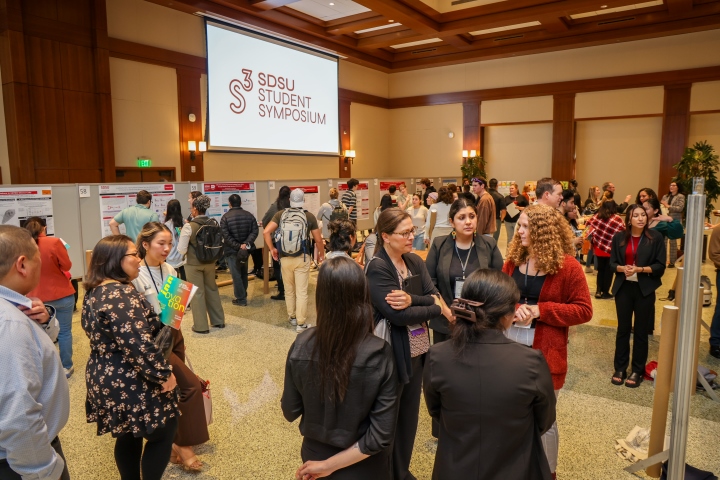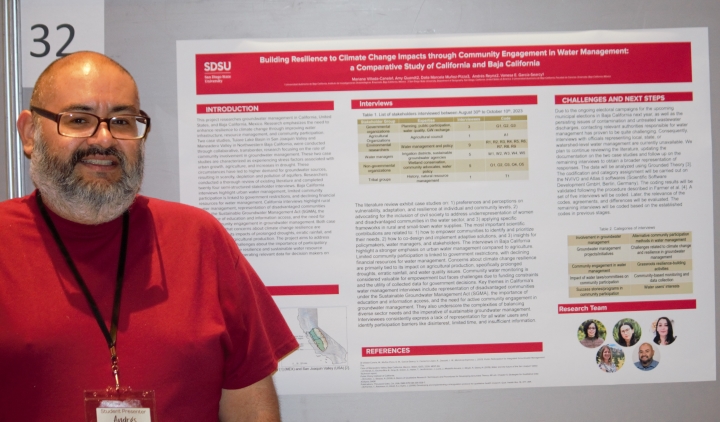SDSU Student Symposium showcases research with International roots

Are low-income migrants along the U.S.-Mexico border at higher risk of obesity because of a lack of social support in their daily life?
Jasmine Rincon, an undergraduate psychology major and research assistant at San Diego State University, aimed to find out. She joined colleagues advised by Assistant Professor of Psychology Jessica McCurley to analyze pre-pandemic data from a free, walk-in Tijuana health clinic just over the border.
Earlier this month, Rincon presented the research findings at the 17th annual SDSU Student Symposium, or S3. The two-day event highlighted student-led research, innovation and art across academic disciplines. More than 650 SDSU students participated this year, making it the largest S3 to date.
Nearly 40 projects had international footprints. Many involved Mexico, highlighting SDSU’s efforts to establish binational collaborations with its next-door neighbor. The university has been a federally designated Hispanic-Serving Institution for more than a decade.
Other research relied on data or fieldwork from countries including Indonesia, Nepal, India, Thailand, Uganda, France, Brazil, Colombia, and Guatemala.
For Rincon, the results of the analysis were inconclusive. While excess weight was prevalent in this underserved population, which faces economic uncertainty, spotty health care, fear of deportation, and other stressors, the data did not uncover a link between obesity and social support.
“Further research is needed to understand the relationship between social support and obesity in this population and create programs to lower the percentage of obesity,” she said.
During oral presentations at S3, Kayla Daniels, a Fulbright Scholar and California State University Sally Casanova Scholar, spoke on her research on transnational activism that sprung from Canada’s first Black women-run newspaper in the 1980s.
Nearby, Jazmin Luna, a graduate student in public administration and Latin American studies, presented her research from interviews with Indigenous women leaders in Oaxaca, who are fighting against the silence and impunity surrounding gender violence in Mexico.
“This is women leading women to be empowered,” she said. “They do have a voice. They are not just victims.”
On the exhibition floor at Montezuma Hall, Andres Reyna, a graduate geography student, shared the progress of ongoing cross-border case studies that search for ways to increase community participation in groundwater management.
 Open the image full screen.
Open the image full screen.The research, which sprung from last year’s binational Re:Border conference, involves a collaboration between SDSU and Universidad Autonoma de Baja California. Reyna’s work focuses on the Tulare Lake Basin in the Central Valley, where some homes lack water, but immigrant communities are wary of speaking out against the government. UABC researchers are working on community engagement near Ensenada, where continued pumping has increased fears of seawater intrusion.
“On this side, people are interested in how they are doing that in Mexico, and how we can do that over here so we get more community members at these meetings and hopefully on advisory councils,” said Reyna. The California Sustainable Groundwater Management Act requires water agencies to seek community input.
In all, about 80 projects won awards at this year’s symposium, with three having international roots.
Brenna Fowler, a graduate geography student, won a Dean’s Award for research using high-resolution drone and satellite imagery from Nepal to examine the effectiveness of various incentive programs for landowners to manage properties in ecologically beneficial ways.
Camille Movafagian, a biology major, took home an Undergraduate Research Excellence Award for analyzing samples of Shaw’s agave from Baja California and Cabrillo National Monument. The goal is to determine genetic diversity in the San Diego agave population, which may be reproducing via cloning.
Erica Axtell, an undergraduate studying Speech, Language and Hearing Sciences, earned a President’s Award along with colleagues McKenna Lee, Laura Fitzgerald and Jessica Kramer for research on how bilingual people learn certain similar words across languages. The study involved online testing in Puerto Rico.
Sponsors for the 2024 SDSU Student Symposium include Eli Lilly, Bristol Myers Squibb, Qualcomm, the University Library, Biocom California, and Cintas.

